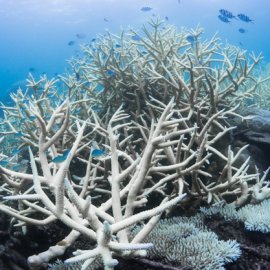Blue Ocean Leadership
-
English
-
ListenPause
[intro music, ocean sounds]
Welcome to World Ocean Radio…
I’m Peter Neill, Founder of the World Ocean Observatory.
If asked what must be the single most necessary change toward successful implementation of any plan for the sustainability of the world ocean, my answer would be “leadership.” We have evidence of deterioration of ocean resources; we have ample data for analysis and understanding of the problem; we have all the necessary information for immediate definition of new policies, procedures, and regulations; we have an international architecture of organizations, government and non-government, informed and prepared to implement change; we have vast sums of finance pledged to underwrite the change. What’s missing?
Recently, a chart passed across my desk entitled “The Mind Map of Blue Ocean Leadership,” a creation of INSEAD, a global “business school” and global programmatic partnership of educational institutions in Europe (France), Asia (Singapore), the Middle East (Abu Dhabi) and North America (San Francisco). The chart graphed existing leadership design and suggested “changes different from convention approaches” -- for example, from a primary focus on personal qualities and behavioral styles to emphasis on acts and activities, from generic principles to market reality, from executive exclusivity to access and involvement of all management levels, from the safety of planning to applied practice, from abstract time to real time impact investment of all resources available.
“Process” was a second focus: from senior management engagement with employees toward actual performance, from new tools deployed for employee engagement, from passive wisdom to direct experience through higher performance, more efficient expense, and more effective results.
“Change” was a third focus: from central authority to delegation and employee involvement, from conventional expectation and safety to innovation and risk, from top-down authority to inside-out engagement, from singular control to collective empowerment, from internal accountability to external constituent service, from stasis and inaction to exploration and success.
Do you hear the difference? In the much-wished-for transformation of knowledge to action, this new orientation is intended to “release the ocean of untapped talent and energy of employees,” to engage the full spectrum of constituents from best intentions to better application of defined goals through re-oriented structures to effective behaviors. Amplify this to discover that the same disconnection applies to the much larger, global picture with similar emphasis and paralysis at the highest level of international policy and implementation, fraught with the same disconnects, the same separation of powers between leadership and constituent, as both participant and recipient of change.
The chart is presented as a “mind map,” an interesting concept that corresponds to a mental schematic or wiring diagram or set of psychological waypoints ostensibly intended to fix and clarify, to guide an actual passage or connection, to establish an effective process to get the job done. If the world response to the challenge of climate change is characterized as “too little, too late,” it would seem clear that the old mind map there too has failed and a new approach, discussed often here on World Ocean Radio, might be a valuable shift toward “more than enough, in time.”
How do we get there, get beyond an abstract visual to a real plan of action? I presume that INSEAN, the global business school, is indoctrinating its students with this new perspective, re-training graduate executives to re-program their leadership roles and methods for evaluation, promoting new case studies of success to share across the world of business education to become accountable themselves as “blue mind map” leaders. The prospect may be daunting. The retraction of international climate and other standards, the retreat of banks to old lending patterns, clients, and loan criteria, the pause or inaction in ratification of proposed treaties, and the re-emergence of regressive thinking, all suggest a “black mind map” will remain. Ultimately, leaders need courage, conviction determined by forward thinking, and an economy conducive to change. But today’s new reliance on old standards, retracted regulation, abandonment of past progress made, and short-term over long-term vision makes for dour prospect.
The ocean will not be forever protected from failed leadership. Its dimension and relation to all things of and beyond economics, its ultimate sustainability, surely demands more than a chart or a graduate school lecture or exemplary individual with courage. What is missing is an ethos, a prevailing character of international community, other than the present operative system of global consumption without limit, without long-term responsibility, only short-term reward, as a preliminary to failure.We will disuss these issues and more, in future editions of World Ocean Radio.
WORLD OCEAN RADIO IS DISTRIBUTED BY THE PUBLIC RADIO EXCHANGE AND THE PACIFICA NETWORK, FOR USE BY COLLEGE AND COMMUNITY RADIO STATIONS WORLDWIDE. FIND US WHEREVER YOU LISTEN TO PODCASTS, AND AT WORLD OCEAN OBSERVATORY DOT ORG, WHERE THE FULL CATALOG OF MORE THAN 700 RADIO EPISODES IS SEARCHABLE BY THEME.
[outro music, ocean sounds]
This week on World Ocean Radio we're discussing the "Mind Map of Blue Ocean Leadership,” a chart developed by a global constituency of business experts, graphed to show existing leadership design while suggesting changes that are different from conventional approaches, charted as a “mind map” intended to fix, clarify, and establish an effective process to get the job done. If the world response to the challenge of climate change is characterized as “too little, too late,” it would seem clear that the old "mind map" has failed, and that a new approach might be a valuable shift toward "more than enough, in time."
About World Ocean Radio
World Ocean Radio is a weekly series of five-minute audio essays available for syndicated use at no cost by college and community radio stations worldwide. Peter Neill, Founder of the World Ocean Observatory and host of World Ocean Radio, provides coverage of a broad spectrum of ocean issues from science and education to advocacy and exemplary projects.
World Ocean Radio
15 Years, 750+ Episodes
Ocean is climate
Climate is ocean
The sea connects all things
- Login to post comments



